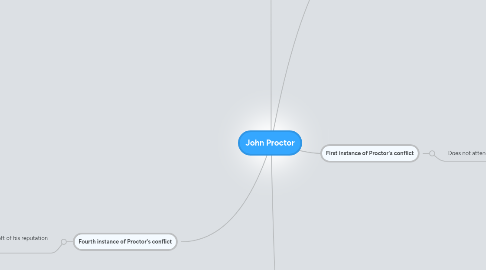
1. What is Salem like?
1.1. Fictionalised account
1.2. Historical setting
1.3. Puritan society
1.4. Attempt to build a "New Jerusalem"
1.4.1. Beacon of hope
1.4.2. Shining light of Christian morality
1.5. Adheres to a very strict model of Christianity
1.5.1. Somewhat fundamentalist
1.5.2. In many ways medieval
1.5.3. The word of the Bible is law
2. First instance of Proctor's conflict
2.1. Does not attend church
2.1.1. Damaging within the context of the society
2.1.2. Used as "evidence" (or at least suggestion) that he is not a Christian man
2.1.2.1. Therefore, he he an ideal candidate to "consort with the devil".
2.1.3. Reveals antagonism between himself and Parris the minister
2.1.3.1. Dislike's Parris's "fire and brimstone" interpretation of the scripture
2.1.3.2. Feels Parris is a careerist; not a man of the people
2.1.3.2.1. This links to the historical controversy of Parris achieving the position in the parish
3. Second instance of Proctor's conflict
3.1. Affair with Abigail
3.1.1. Nature of the affair is not made explicit in terms of length of time
3.1.1.1. It is clear there was a sexual element
3.1.1.1.1. This lays the community's sin of "lechery" at his feet
3.1.2. Breaking one of the ten commandments
3.1.2.1. The commandment he later cannot recall when asked
3.1.2.2. Further suggestion that he is not a "Christian" man
3.1.3. Sets one of the main threads of the conflict
3.1.3.1. Abigail's continued love for Proctor led to her drink "a charm to kill Goody Proctor"
3.1.3.1.1. The affair also develops tension within the Proctors' marriage
3.1.4. He is a reasoned voice working against the majority who have been led by Abby
4. Third instance of Proctor's conflict
4.1. He refuses to be drawn into the witch hysteria
4.1.1. This sets him outside the viewpoint of the town
4.1.2. Makes him suspicious to those who subscribe to the mania
4.1.3. His evidence against Abby should lead to the end of the madness
4.1.3.1. Instead, it sets him in opposition against the town
4.1.3.2. Brings suspicion upon him
4.1.3.3. Forces him to surrender his good name
4.1.3.3.1. His "lechery" is to be made common knowledge
4.1.3.3.2. Also sets him on course to be tried for witchcraft
4.1.3.3.3. Irony of the Puritan term of address "Goodman"
4.1.3.4. Results in him tarnishing his wife as a liar in the eyes of the court
5. Fourth instance of Proctor's conflict
5.1. Refuses to surrender what is left of his reputation to the court
5.1.1. Has already admitted to lechery and shattered his wife's image in the community as an honest woman
5.1.2. Is pressed to confess to witchcraft in order to save his life
5.1.3. Hale, by this stage riven with guilt, implores him to do so
5.1.3.1. Hale has seen the error of the court when so many innocents are hauled in as witches
5.1.4. Will not sign the confession drawn up by the court
5.1.4.1. In his view, simply having admitted the crime to the court should be enough
5.1.4.1.1. Feels that signing his name and having it pinned to the church door is an act of humiliation rather than justice
5.1.5. Will not name anyone else as a witch
5.1.5.1. This makes it clear to the court that he is acting purely to save his name, and that the confession is a fraud
